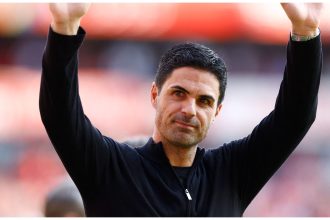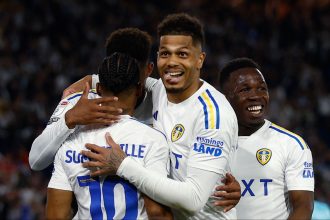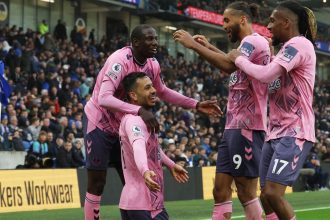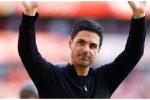Despite the recruitment revolution INEOS have led at Old Trafford, the manager appears to be very much in charge
When Manchester United finally took the decision to keep faith with Erik ten Hag last month, they were keen to emphasise that next season would be different to the disaster of a campaign that came before.
After considering a number of options and holding serious talks with Thomas Tuchel, United decided that Ten Hag was still the best man for the job. That was despite ending the campaign in eighth, their lowest Premier League finish, losing 14 games and having a negative goal difference.
The FA Cup final win over Manchester City, the champions' only defeat of 2024, showed that Ten Hag was still a top coach, so went the logic, while there were mitigating circumstances to explain their terrible league form and the fact they had bombed out of the Champions League and Carabao Cup.
The worst injury record in the league was clearly a key factor but so too was the fact that the club was undergoing a strategic review for half the season. And even after INEOS' partial takeover was confirmed in February, there was still a transition period – hardly ideal circumstances to work in.
"Our review concluded that Erik deserves a chance to show what more he is capable of within the new sporting structure we are building," explained a club source at the time.
However, one month out from the new season, it looks like Ten Hag still has a lot of influence on what goes on at Old Trafford. Rather than his position being weakened by the confusion surrounding his future, he appears emboldened.
Manchester UnitedDouble Dutch
In the immediate aftermath of the FA Cup final triumph over City, Ten Hag found himself in the highly unusual position of celebrating a trophy win and perhaps the best result of his two-year era while having to bat away questions about his position. Yes, Ten Hag had come out swinging, but he was walking out with two black eyes and a split lip.
Now the manager is sitting comfortably on the throne, exerting as much power as before, if not more. Take his coaching staff: Benni McCarthy and Mitchell van der Gaag have left but they have been replaced by two Dutchmen.
One is Ruud van Nistelrooy, a crowd-pleasing appointment given his status as one of the club's greatest ever strikers but also a respected coach who was in charge of PSV just two seasons ago.
The other is Rene Hake, whom Ten Hag has known for nearly two decades. Hake is also highly qualified and recently led Go Ahead Eagles, the club Ten Hag used to manage, to their best-ever finish in the Dutch top flight. Ten Hag has also looked to his homeland for his latest goalkeeping coach, Jelle ten Rouwelaar.
United might have appointed a new set of recruiters, but unless there is a universal sense of admiration for Dutch football among the club's hierarchy, it looks like Ten Hag is still making the big decisions.
AdvertisementMan UtdTransfer trauma
The same could be said in terms of transfers, the one area that really needed shaking up. United's previous sporting director John Murtough, one of the great corporate survivors until he was finally moved on earlier this year as part of the INEOS infrastructure, had little authority in the transfer market.
He wasted time pursuing Frenkie de Jong in Ten Hag's last summer when it was clear the midfielder did not want to leave Barcelona for United. Instead he ended up signing Casemiro in a blind panic, blowing a total of £140 million ($182m) over four years for a player who had one good season but was a walking catastrophe in his second.
He gave too much power to Ten Hag, sanctioning an £85m ($111m) deal for Antony, which looks like the worst transfer in Premier League history, and greenlighting moves for fellow Eredivisie players Tyrell Malacia and Lisandro Martinez. Only the Argentine's transfer has turned out well.
Manchester UnitedZirkzee – a new Weghorst?
The arrival of Ashworth and Wilcox was supposed to put a stop to Ten Hag's Eredivisie/Dutch overhaul of United and bring some sense to United's transfer dealings.
Ashworth built his reputation as a top recruiter with West Bromwich Albion and then at the FA, compiling the 'England DNA' blueprint for success alongside Gareth Southgate. He then went to Brighton, making the Seagulls the envy of the Premier League when it came to unearthing little-known gems such as Moises Caicedo, and continued his good work at Newcastle. Wilcox, meanwhile, had run Manchester City's academy for years, helping turn it into a money-printing factory as well as producing the likes of Phil Foden and Oscar Bobb.
So, who was United's first signing of the summer? Netherlands striker Joshua Zirkzee. As it turns out, Zirkzee left his homeland when he was a teenager and never played in the Eredivisie, coming through Bayern Munich's youth ranks and thriving in Serie A. Costing £36.5m ($47m), the 23-year-old looks like a smart signing albeit not a world-beating one, given he scored just 11 league goals last season. But the fact he is Dutch is intriguing.
Zirkzee had a limited role at the Euros, playing just three minutes. Wout Weghorst, another Dutch United signing who flopped in his five-month loan spell at Old Trafford, failing to score a Premier League goal, was seen as a much bigger threat. And that does not inspire confidence in Zirkzee.
Getty ImagesDe Ligt on a downward path
United's interest in Matthijs de Ligt is also interesting. Ten Hag worked closely with the centre-back at Ajax, naming him as his captain when he was just 18. De Ligt looked destined for greatness when he broke through, helping Ajax win the double and reach the Champions League semi-finals, but he has gone backwards since leaving Amsterdam in 2019.
He had an up-and-down spell with Juventus, losing his place to Turkey international Merih Demiral after making a number of individual mistakes. The Old Lady decided to take a hit on their €85m (£72m/$92m) investment and sold him to Bayern Munich for €67m (£56m/$73m).
De Ligt was a regular in his first season and won a third career title thanks to Borussia Dortmund's incredible bottle job. But Bayern wanted to bolster their defence that summer and did so by signing Kim Min-jae. They strengthened again in January by signing Eric Dier.
As a consequence De Ligt started less than half of Bayern's matches in all competitions, albeit a lot of his absences were down to injury. New Bayern boss Vincent Kompany does not seem to count upon De Ligt and is happy for him to move on, while Bayern, like Juve before them, are braced to swallow their losses in order to get rid of him.






